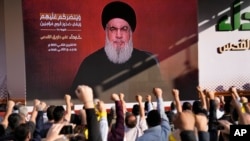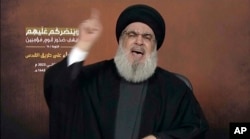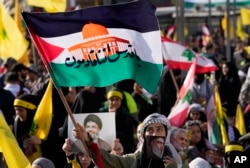Hezbollah leader Hassan Nasrallah sought in a widely anticipated speech Friday to portray his extremist group as vigorous defenders of the Hamas militants fighting in Gaza without drawing his own country, Lebanon, into a full-scale war with Israel.
Nasrallah also denied any responsibility for the October 7 massacre of 1,400 people in Israel, describing it as “100 percent Palestinian,” and said he held the United States directly responsible for the resulting war in which thousands of Palestinians have died.
Nasrallah did not announce an intention to enter the war, as some had feared, arguing that through a weekslong exchange of rocket and artillery fire with Israel, Hezbollah had already entered the war. He said a further escalation on the Lebanese front was a realistic possibility, but analysts noted that he described no concrete steps Hezbollah would take.
Both Hezbollah and Hamas are backed by Iran and have committed themselves to the destruction of Israel. The United States and the European Union have designated both groups as terror organizations.
Analysts told VOA that Nasrallah appeared to have calibrated his remarks, taking into consideration that Lebanon could not endure massive destruction as is happening in Gaza because it already is reeling from a crippling economic crisis.
Regarding the Lebanese front on Israel’s northern border, he said, “all the options are open to us, and we studied all the options. We must be ready and be ready for all the options that could happen in the future."
Lebanese analyst Dania Koleilat Khatib told VOA that Hezbollah was playing psychological warfare with Israel by keeping it guessing about any next moves.
Nasrallah "wants three things: to keep the IDF [Israel Defense Forces] busy, confused and scared,” said Khatib, president of the Research Center for Cooperation and Peace Building in Beirut.
“People were expecting him to say that we [Hezbollah] are entering the war or we will not enter the war. Instead, he said we have already entered the war. We will do more. I think the purpose of this speech was to increase the confusion among the Israelis,” Khatib said.
She added that the most important thing Nasrallah urged was the need for a cease-fire in Gaza in order to prevent an all-out regional war.
Nasrallah said Hezbollah “considers that it is already at war, not only in absolute terms, but in a very concrete way since October 8,” according to Rita Sassine and Anthony Samrani, writing in the Lebanese L’Orient Le Jour newspaper.
Hezbollah has been involved in tit-for-tat attacks on Israel’s northern border involving rockets, missiles and explosive-packed drones with a gradual escalation on both sides. Hezbollah said it launched 19 simultaneous strikes on Israeli positions in the north of the country on Thursday, saying earlier it was the biggest attack in more than three weeks of fighting.
Sassine and Samrani also pointed to Hezbollah’s official announcement of the “death of each of its martyrs because it wants to highlight that it is not at all keeping away from the fighting, but that it is already actively participating in forcing Israel to concentrate part of its resources and attention on its northern border.”
They noted that Hezbollah had announced the deaths of nearly 55 fighters "in a relatively short period of time.”
Nasrallah also urged Arab states with diplomatic ties with Israel to send the Israeli envoys home, stop trade and cut all other relations. He belittled the presence of two U.S. aircraft carriers that have been deployed to the region to deter Hezbollah and Iran from escalating the conflict into a regional war.
“They don’t scare us. They never scared us in the past,” he said.
Speaking in Israel, U.S. Secretary of State Antony Blinken warned of the dangers of a broader war, with fighting on two or even three fronts.
Blinken reiterated U.S. support for Israel as he met Israeli Prime Minister Benjamin Netanyahu, but he urged Israel to take steps to avoid civilian casualties as the Palestinian death toll soars.
"It is very important, when it comes to protection of civilians who are caught in the crossfire of Hamas' making, that everything be done to protect them and to bring assistance to those who so desperately need it, who are not in any way responsible for what happened on October 7," Blinken said.
He also called for localized humanitarian pauses as the crisis in Gaza worsens. Blinken told Israeli leaders that “Israel will never stand alone” and that “it has the right to defend itself and the obligation to defend itself.”
But he said that a failure by Israel to protect Palestinian civilians played into the hands of Hamas and other terrorist organizations. Blinken said there would be a substantial increase in humanitarian aid into Gaza and in the effort to get foreign nationals out.








